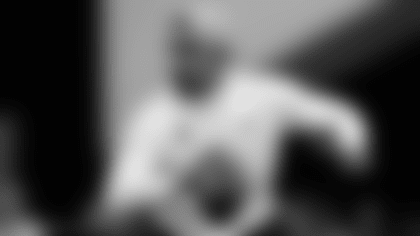On preparing a solid gameplan and then having something break down in a game and putting you on your heels: "Yeah, each week we've tried to overcome something different. As I've said, here before, someone asked about the kick coverage last week, it was solidified. I said, 'There's no permanence.' There's always some potential for a problem. There's always potential for something, so you have to always keep improving. You can't always stay at the summit, but you want to be fairly close to it in your play each week, in each phase. When you have a letdown in one phase or the other, it certainly decreases the probability of winning the game.
"And it almost did in this case. It's happened to us and we just have to rise and really, you know, get some base hits when we got people in scoring position not when the game is out of reach. We got to do that. When that situation arises, we really have to take charge of it. That's where we really have to get better. Not so much if it happens the first play, but you always want to do well but when you have to do well. The last kickoff we're up by 10 and we had a chance to really give our defense the field position to probably be successful; doesn't mean they will be. To give them a greater probability and we came up short. It can be exasperating at times, but that's why we're here to try to overcome the problems. And when we don't, we're responsible for not overcoming them."
On whether special teams skills are taken into consideration when involving a trade, such as sending RB Mike Bell to Cleveland for RB Jerome Harrison: "Well, I would think so, yeah. The thing that he has to do – and it's tough and I've said this before, too, and I hate to be repetitive – but if all of us as coaches can look through the eyes of the head coach, we'd have a lot easier time to see why any decision is made because you've got to slice this thing up to give you the greatest probability of winning the game. Whatever it takes, however, you have to use these ingredients, he's got to do it. If we ended up number one in the league in special teams and didn't go to the playoffs, that's not doing him any good.
"He's the only guy really in the building among the coaches that when he walks out of the locker room, whether you win or whether you lose, that's all that counts. There's a chance that if a position plays just lights out and we lose the game, that coach or that player won't be as sad about it as (head) coach (Andy) Reid would be. Whatever moves we make I know he's making them for the benefit of the football team; whatever is best for the football team. I'm always for him."
On how patient Reid has been with him: "Coach Reid has been tremendous. He has been tremendous in everything. I couldn't ask for more to be honest. Any infallibility that we're experiencing is solely on myself. The players have worked hard and I get tremendous help out of the rest of the coaching staff. They're more help here than anywhere. (TE coach) Tom Melvin coaches a position team, (WR coach David) Culley coaches a position and we've got a lot of other guys who are involved daily. We try to compress those minutes as tight as possible and get as much done as possible. At times we've got, you know, we're working field goal and while we're working field goal, guys that are returners are doing ball security drills and guys that are on the hands team are doing hands team drills. We throw them squibs, or we throw them the ball quick and they have to react. We're trying to maximize every minute and to do that, obviously there's a lot of coaching involved in that. This is the first time that I've ever had an assistant, by the way, who's doing a great job – Jeff Nixon. I never had an assistant before.
"I just have to do a better job relaying the information that I have. I can teach the stuff after the fact, but the real secret of success in coaching is making sure you address it before the problem. We just have to do a better job of doing that and these guys will play. Whatever problems we have, they're league-wide. Special teams is a different animal, really, when it comes to a lot of things; it's just different. Right now there's a plethora of big plays on special teams. Not to excuse us because we're below average. It just happens to be at this particular time. I'm not sure why. I had a reporter ask me why I thought there were so many touchdowns. Vic Carucci was the guy I talked to and he said after five games there have been more punt returns, kickoff returns for touchdowns than there have been in the last 60 years. I don't know if that's a fact because I don't have all the stats. I had no answer for that."
On whether guys have been pressing too hard in trying to correct something: "Our number one priority I'll say on kickoff coverage is to get the guys to play as hard and as fast as they can. That's the number one thing because you cannot be good unless you do that. There are a lot of things that are essential to be good, but that's an absolute must. There's a possibility with, I would say maybe some of the younger guys – and a lot of them are younger guys – that they're trying to live up to that possibility. The faster you go, the more chance you have for making a misjudgment. If you try to read and go slow, you get run over. I think that's part of the equation. I just think I have to do a better job of coaching the concepts, getting it taught better, being a better teacher and being a better motivator. I have no problem with any of the players. I have no problem with them."
On whether it's a typical makeup to have a lot of linebackers and running backs on kickoffs: "I wouldn't say it's typical. You really need – you like to have big, fast players because you have to run back to get in to the formation. When you get on the mat with somebody that weighs 60 pounds more than you, I don't care how fast you are, it's pretty hard to block a guy that has been running full speed for 40 yards and he outweighs you by 60 pounds. You have to have some kind of punch. I don't care if you bench press 500 pounds. If a DB or receiver weighs 190 and he's taking on a linebacker coming down the field that weighs 240, that's pretty hard to control and that's what you have to do. You have to literally control him in space.
"I think our kickoff coverage is – we have our moments – I think it's progressively getting a little bit better. Our starting point is pretty good. I think it will stay pretty good. We want it to be excellent. If we can stay away from penalties, which is big 'if' – in the kicking team, a big 'if' – I think we'll progressively get to where we're pretty good. I think (CB) Ellis (Hobbs) is really good and I think (CB Jorrick) Calvin is really good. And Calvin will get work and he'll continue to get work. Ellis' role and his legs and his ability to be fresh in everything.
On whether he's ever been in a situation like this in his career where things have been up and down: "Many, many times. Let me say this about coaching, there really are no bad days in coaching. Some days are better than others. It's always great, but you're always putting out fires. I've been on two teams that have gone on to the Super Bowl, I've been number one in special teams a bunch of times and I've been on college teams vying for national championships. Every day you're trying to correct and put out a fire. Not to say, 'Yeah, this is acceptable.' I know I look young, but 35 years of coaching, yeah, more times than I can remember. (Laughing) There were some times I remember where it's been a lot a better and we'd like to be experiencing that more. Like I said about infallibility, I certainly have no illusions that I have for sure; nor than any player is."
On where he envisions Harrison fitting in:"This is not going to sound great in the interview. I don't know that much about him except for the kind of year he had a year ago as a running back. I tried to look up some stuff, (but) of course I'm worried about Atlanta, not how many units he played on last year. We didn't find that much on him on playing special teams, but that doesn't mean maybe a few years ago he wasn't very good; just the most recent stuff. I didn't personally have a lot on him, so I need to kind of catch up on where he's at special teams-wise. He may be a guy that's never played. Maybe (he's) a guy that's really good. Recently that hasn't been his role."
On where he envisions RB Joique Bell fitting in: "Joique Bell is a guy that probably, again, he was a rookie, we got him, he hasn't played that much. He probably will go through some growing pains. Maybe even right now, we just have to give him a chance. He just played in one game. One game is not enough to tell what you can really do. It's got to be a kind of progression. He hasn't been given an opportunity."
On whether the young core of players have had an effect on some of the opposition's bigger returns: "It usually takes guys some time to get acclimated to that area a little bit more. I think most of the time the acclimation is mental. Like I said, their work, their exertion, their energy, their attention and everything is usually done in anonymity. They probably got recruited because of how they played at running back and not how they played on the punt team. They probably got drafted here by how they cover one-on-one in bump coverage than how they cover a kick. They've never been rewarded for playing on special teams. So I think, initially, there's a lot to overcome in terms of, 'What's in it for me when I do this?' We get to win the game. A lot of people don't grow up that way.
"Maybe the mental part is more – but the physical part is also, as well. I'm not claiming that's the case with everybody because there are a lot of guys that are innately team guys. They'll go down and spill their guts no matter what because they know they'll get to win. Like I said, it's tough to get a whole organization. Even myself and that's my philosophy to look through the eyes of the head coach. And I have a tough time doing it. And I've had that philosophy since I was in high school because I knew I wanted to be a coach and that's what my high school coach told me, 'If you want to be good, that's how you have to be good.' I still have a tough time and I've been doing it daily, concentrating on it, daily for years."













